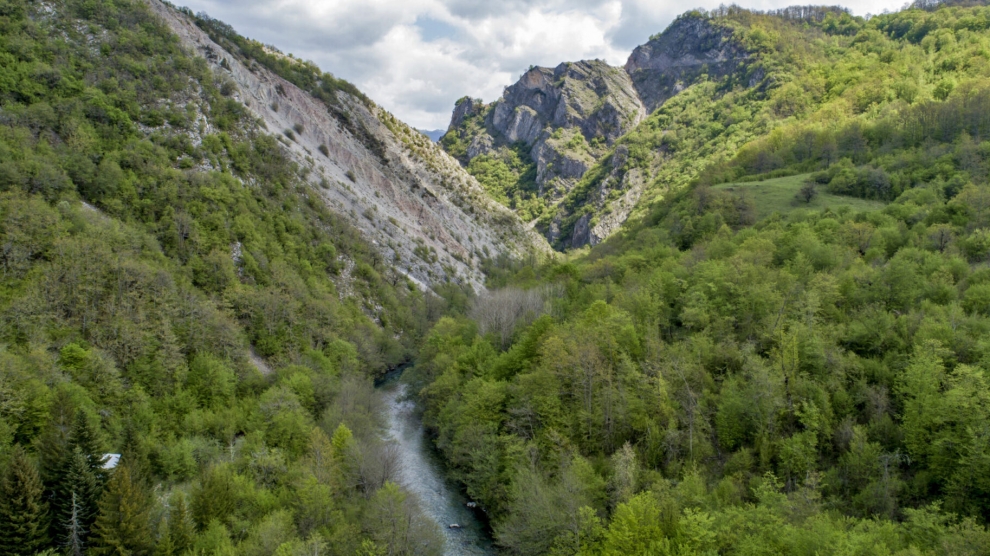Six environmental NGOs have submitted a complaint against Bosnia and Herzegovina to the Bern Convention on the Conservation of European Wildlife and Natural Habitats for failure to protect the pristine upper stretches of the river Neretva from eight planned hydropower projects.
The upper Neretva in one of the most pristine river ecosystems in the Balkans which the six NGOs – Center for Environment, Aarhus Center Sarajevo, Riverwatch, EuroNatur, ClientEarth and CEE Bankwatch Network – now claim is under threat from the 35 MW Ulog hydropower plant and a series of seven smaller plants known as the Upper Neretva Hydropower project. The plants would turn most of the upper part of the river – a stretch of around 30 kilometres – into a series of end-to-end dams, pipes and reservoirs.
The submission to the Bern Convention follows a related complaint made by the groups earlier this year to the Energy Community Secretariat, highlighting serious flaws in the environmental permitting processes for the projects.
The environmental impact assessments carried out for the projects identified only a few of the species likely to occur near the site of the plants, but still concluded that the projects could go ahead. Despite the area being inadequately researched, rare species including bears, wolves, otters and crayfish, as well as a specific type of trout are known to find habitat here.
In May, the Center for Environment also mounted a court challenge against a decision by the Republika Srpska Ministry for Spatial Planning, Construction and Ecology, that no environmental impact assessment was needed for phase one of the Upper Neretva project. The decision came despite the Republika Srpska Institute for the Protection of Cultural-Historical and Natural Heritage expressing its objection to the planned Upper Neretva project and stressing that rare, endemic and relict species would be affected by the plants.
The predominantly Serb Republika Srpska is one of two entities which make up Bosnia and Herzegovina.
“The upper Neretva river is a natural jewel of the Balkans. With the surrounding pristine forests, it forms a wilderness area that is unparalleled in Europe. The dam projects would not only destroy this ecosystem, but Bosnia and Herzegovina would also violate ratified international agreements. That’s why we file these complaints,” says Ulrich Eichelmann, coordinator of the Save the Blue Heart of Europe campaign at Riverwatch.
“According to the research done so far, the area around the source and the upper course of the Neretva River has been confirmed to be an exceptionally intact ecosystem. These projects need to be stopped due to its exceptional value as no mitigation measures could preserve this area,” adds Jelena Ivanic from the Center for Environment.
The Ulog hydropower plant, with a 53 metre high dam and 2.7 kilometre derivation tunnel, is the furthest downstream of the planned plants. It is currently undergoing preliminary works, with China’s Sinohydro as the main contractor. Work on the plant first started in 2013, but in July of that year, two fatal incidents took place and works stopped. On July 4 a worker was killed by a rock breaking off a cliff face while building access roads. Only four days later another worker was also killed by a rockslide, and another worker taken to hospital. Work was then put on hold while more research was done, but in 2017 the project was redesigned with the dam slightly further downstream.
—
Photo: Robert Oroz
—
Unlike many news and information platforms, Emerging Europe is free to read, and always will be. There is no paywall here. We are independent, not affiliated with nor representing any political party or business organisation. We want the very best for emerging Europe, nothing more, nothing less. Your support will help us continue to spread the word about this amazing region.
You can contribute here. Thank you.







[…] Environmental groups raise alarm over Bosnian hydropower project – Emerging Europe Environmental groups raise alarm over Bosnian hydropower project Emerging Europe […]